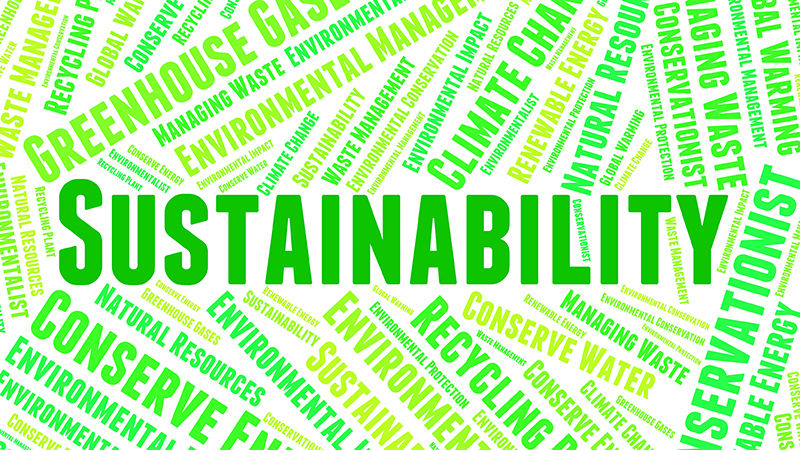

This dialog contains the full navigation menu for this site.

Sustainability is more than just “going green,” and Penn State has long been committed to the broader scope of what sustainability encompasses, which is combining environmental quality, economic well-being, and human health and happiness for current and future generations. Penn State Altoona is on the forefront of these goals and recently took another big step in integrating sustainability into the University’s research, teaching, outreach, and operations.
The Penn State Altoona Sustainability Council was created in 2010 in order to make recommendations directly to the chancellor regarding sustainable development, coordination, and goal-setting at the college. This includes preservation of natural and historical features and to exchange information regarding successful sustainability activities. Penn State Altoona was the first of the Commonwealth campuses to have its council chartered in 2012, which was a huge turning point for the council and the college. Over the last several years, because of access to internal funding through the charter, along with an external grant from the Blair County Conservation District, the council was able to establish a native plant riparian buffer pilot area along Spring Run, which helps increase water quality and reduce pollution. With another Chancellor’s Development Fund award, the council got the ball rolling on a plan to increase outdoor recycling containers. It has also established a farmer’s market on campus in partnership with the Blair County Conservation District and the manager of the Juniata Farmer’s Market, created a permanent fire circle at the base of Seminar Forest, and supported Earth Day activities, workshops, and student internships.
This year, the college became the first Commonwealth Campus to add sustainability on the Faculty Activity Report (FAR), which is the faculty equivalent of the University’s annual staff review process. That particular section of FAR will reflect faculty contribution to the college's programs to enhance sustainability. “We're setting a precedent,” states Sustainability Coordinator Lisa Emili, who is also an associate professor of physical geography and environmental studies at Altoona. “This isn’t a punitive measurement, but rather a way for faculty to get some recognition for the work they may already be doing with sustainability. It’s also a way to provide incentive to and engage even more faculty.” Emili sees this as a chance to really expand the reaches of sustainability around Penn State Altoona and beyond. “We want to be on the forefront of engaging not just our faculty and staff, but our students.”
By targeting faculty, Emili hopes many will begin to use teaching modules about sustainability in their classes. She believes that could lead to bringing a student on board for a project or some kind of research or inspire another student for an undergraduate project or paper that has the potential to reach a wide audience. It will send students into the world with a mindset of sustainability acting as conduits to the larger community - sort of a sustainability domino effect. “I believe this is a stepping stone toward people wanting to increase the visibility of sustainability.”
Emili is pleased that Penn State Altoona is following the motto of the Sustainability Institute at University Park, which is "Learn, Live, Lead." She notes that in the first year after receiving its charter, Penn State Altoona’s council did a lot of learning: about the kinds of projects they could do, what grants they could apply for, and finding out what others were doing and how. In the second year, the council really started to live what they learned. For instance, instead of just having an informational workshop, they brought in a nutritionist who walked through the farmer’s market, picked out real produce from the farmers, then sat down with folks to talk about the values of whole foods and local foods, the ethics, the science, and the nutritional value behind it. “That’s the sort of thing that is really living sustainability,” states Emili. “Not just implementing things, but actually building on them and making them a part of everyday life.”
Emili says she feels this third year of the charter is when the college has hit a stride in leading. She’s been contacted by other Commonwealth campuses for advice on developing their own charters and creating sustainable initiatives. She believes FAR is just one more way Penn State Altoona can be a model for other institutions.
“We're happy to be a resource. I feel like we have a great place in sustainability, and a voice that says ‘we're here, we're doing this.’ With the structure we built and the support of the chancellor, now is the time for all of us to essentially pool our resources, ideas, and initiatives that relate to sustainability. There are a lot of good things going on across the University and a good place to start that networking is through sharing our story and opening up a forum for idea sharing.”
While the council works to bring bigger projects like composting and LEED-certified buildings to campus, Emili says there are many smaller things to accomplish in the meantime. She continues to coordinate internships on and off campus focused on sustainability. There are research-related projects and service projects, and many plans in the works to expand experiential learning at Seminar Forest for students and the community. There is an on-going water quality project and plans for a Spring Run stream clean-up next semester. Emili believes small steps are just as influential as big ones. “That’s my philosophy of how we are going to spread sustainability and meet the idea of integration in our curriculum, in our research, in our service, and in our operations. One small seed will grow into a tree and eventually into a forest. Small things can add up to big changes.”
And those changes can only benefit the planet and its people.


